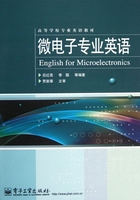
Reading Materials
Imperfections and Impurities in Solids
Up to this point,we have been considering an ideal single-crystal structure. In a real crystal,the lattice is not perfect,but contains imperfections or defects;that is,the perfect geometric periodicity is disrupted in some manner. Imperfections tend to alter the electrical properties of a material and,in some cases,electrical parameters can be dominated by these defects or impurities.
One type of imperfection that all crystals have in common is atomic thermal vibration.  A perfect single crystal contains atoms at particular lattice sites,the atoms separated from each other by a distance we have assumed to be constant.
A perfect single crystal contains atoms at particular lattice sites,the atoms separated from each other by a distance we have assumed to be constant.  The atoms in a crystal,however,have a certain thermal energy,which is a function of temperature. The thermal energy causes the atoms to vibrate in a random manner about an equilibrium lattice point. This random thermal motion causes the distance between atoms to randomly fluctuate,slightly disrupting the perfect geometric arrangement of atoms. This imperfection,called lattice vibrations,affects some electrical parameters,as we will see later in our discussion of semiconductor material characteristics.
The atoms in a crystal,however,have a certain thermal energy,which is a function of temperature. The thermal energy causes the atoms to vibrate in a random manner about an equilibrium lattice point. This random thermal motion causes the distance between atoms to randomly fluctuate,slightly disrupting the perfect geometric arrangement of atoms. This imperfection,called lattice vibrations,affects some electrical parameters,as we will see later in our discussion of semiconductor material characteristics.
Another type of defect is called a point defect . There are several of this type that we need to consider. Again,in an ideal single-crystal lattice,the atoms are arranged in a perfect periodic arrangement. However,in a real crystal,an atom may be missing from a particular lattice site. This defect is referred to as a vacancy. In another situation,an atom may be located between lattice sites. This defect is referred to as an interstitial. In the case of vacancy and interstitial defects,not only is the perfect geometric arrangement of atoms broken,but also the ideal chemical bonding between atoms is disrupted,which tends to change the electrical properties of the material.  A vacancy and interstitial may be in close enough proximity to exhibit an interaction between the two point defects. This vacancy-interstitial defect,also known as a Frenkel defect,produces different effects than the simple vacancy or interstitial.
A vacancy and interstitial may be in close enough proximity to exhibit an interaction between the two point defects. This vacancy-interstitial defect,also known as a Frenkel defect,produces different effects than the simple vacancy or interstitial.
The point defects involve single atoms or single-atom locations. In forming single-crystal materials,more complex defects may occur. A line defect,for example,occurs when an entire row of atoms is missing from its normal lattice site. This defect is referred to as a line dislocation. As with a point defect,a line dislocation disrupts both the normal geometric periodicity of the lattice and the ideal atomic bonds in the crystal. This dislocation can also alter the electrical properties of the material,usually in a more unpredictable manner than the simple point defects.
Foreign atoms,or impurity atoms,may be present in a crystal lattice. Impurity atoms may be located at normal lattice sites,in which case they are called substitutional impurities . Impurity atoms may also be located between normal sites,in which case they are called interstitial impurities . Both these impurities are lattice defects and are schematically shown in Fig.2.6. Some impurities,such as oxygen in silicon,tend to be essentially inert;however,other impurities,such as gold or phosphorus in silicon,can drastically alter the electrical properties of the material.

Fig.2.6 Two-dimensional representation of a single-crystal lattice showing.
Words and Expressions
tetrahedral adj. 有四面的,四面体的
interpenetrate v. 相互穿插,相互贯通
horizontally adv. 地平地,水平地
sulfur n. 硫
zinc sulfide 硫化锌
cadmium sulfide 硫化镉
orientation n. 方向,方位,定位,倾向性
breakage or cleavage plane 解理面
invariant adj. 不变的
bisector n. 二等分线平分线
thermal equilibrium 热平衡
inert element 惰性元素
repulsive adj. 排斥的
sodium chloride 氯化钠
dipole n. 双极子、偶极
gaseous adj. 气态
phosphorus n. 磷
crystal n. 晶格
Glossary of Important Term
primitive cell 原胞
lattice constant 晶格常数
diamond 金刚石结构
zincblende lattice structures 闪锌矿晶格结构
face-centered cubic(fcc)lattices 面心立方结构
rock-salt lattice 岩盐晶格结构,氯化钠晶格结构
wurtzite lattice structures 纤维锌矿晶格结构
hexagonal close-packed lattices 六方密排晶格结构,六方密堆积晶格结构
Miller indices 密勒指数
basis vector 基矢
Wigner-Seitz cell 维格纳—塞茨原胞
reciprocal lattice 倒格子
the first Brillouin zone 第一布里渊区
body-centered cubic(bcc)体心立方
ionic bond 离子键
covalent bond 共价键
metallic bond 金属键
Van der Waals bond 范德华尔斯键
lattice vibration 晶格振动
point defect 点缺陷
Frenkel defect 弗仑克尔缺陷
line defect 线缺陷
line dislocation 线位错
substitutional impurities 替位杂质
interstitial impurities 间隙杂质
Exercises
1. Translate the first 2 paragraphs in reading material into Chinese.
2. Answer the following questions in English.
(1)Describe the procedure for obtaining the Miller indices that describe a plane in a crystal.
(2)What is meant by a substitutional impurity in a crystal?What is meant by an intcrslilial impurity?
3. Calculation.
(1)Determine the number of atoms per unit cell in(a)face-centered cubic,(b)body-centered cubic,and(c)diamond lattice.